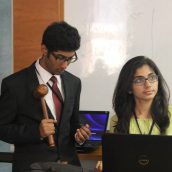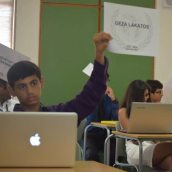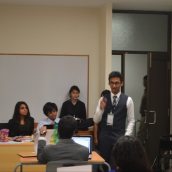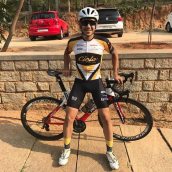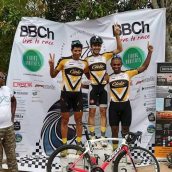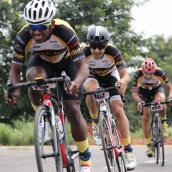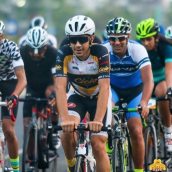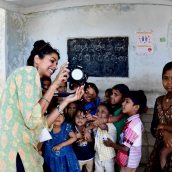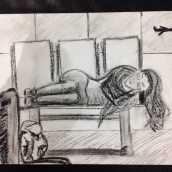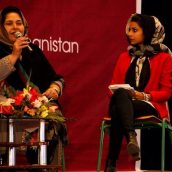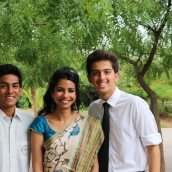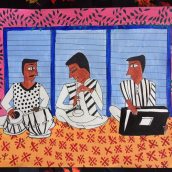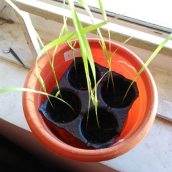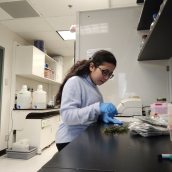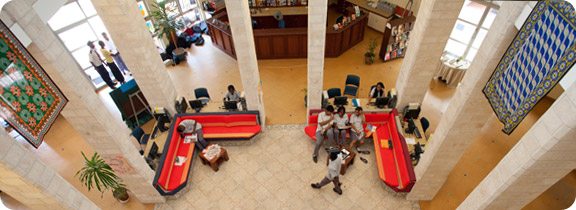
Articles of Interest
The articles listed below have been drawn from the Aga Khan Academies newsletter. They include feature stories and information on aspects of the Aga Khan Academies programme.
Subscribe to the Aga Khan Academies newsletter
Videos
The Aga Khan Academy Maputo is committed to developing future leaders by delivering Excellence in Education. We offer merit-based admission to our International Baccalaureate (IB) programme at our purpose-built world-class campus in Maputo, Mozambique. Watch our newly released video to learn more about our unique offering.
The International Baccalaureate featured the Aga Khan Academies and our approach to creating home-grown leaders as part of their 50th anniversary commemoration. Watch to learn how the Academies work to transform the communities in which they are located.
This is Abdirahman, a student at the Aga Khan Academy Mombasa. During his time at the Academy, he explored his wide-ranging abilities and developed an initiative that helped change the lives of young girls in Mombasa.
Meet Abdalla, a Somali student from the Aga Khan Academy Mombasa. He shares his journey of self-discovery: Abdalla solidified his multiple identities, fostered his strengths, and created positive social change during his years at the Academy.
Women and girls are strong, fearless, courageous, limitless, and powerful. The Aga Khan Academy Hyderabad celebrated International Women's Day on 8 March 2018 with this video.
Video by AFD – Agence Française de Développement about how children at the Aga Khan Academy Maputo "Dare to Dream Big" in their new school facilities. The Aga Khan Academy in Maputo, Mozambique has been growing since it opened its doors in 2013. The second phase extension was completed in early 2018 and included bigger classrooms, extended outdoor play areas, a library, an art room and a science lab.
This is Mercy, a teacher at the Aga Khan Academy Mombasa who joined through the Teacher Preparation Programme. Mercy fosters profound and meaningful relationships with everyone around her and consistently encourages her students to be the best versions of themselves.
Meet Sadiq, a student at the Aga Khan Academy Mombasa. Open-mindedness, confidence and time management are some of the many characteristics he has developed at the Academy that will help him achieve his dream of becoming a journalist.
Meet Saumya, a student at the Aga Khan Academy Mombasa. A musician and a leader, she shares her wisdom on what it means to make a true positive impact.
Introducing Ivy, a student at the Aga Khan Academy Mombasa. Her innate drive for self-growth and desire to give back to the community makes her a true home-grown leader.
Meet Felix, a student at the Aga Khan Academy Mombasa. With a keen early interest in science, he shares his dreams for the future and explains how the Academies have helped foster his ambitions.
This is Stephen, a student at the Aga Khan Academy Mombasa. His passion for community service shines as he expresses the growth in perspective he experienced through his education at the Academy.
A day at the Aga Khan Academy Mombasa's Junior School, seen through the eyes of the students.
Students and teachers from the Aga Khan Academy Hyderabad are featured in this film from the International Baccalaureate about the Middle Years Programme.
This film by the International Baccalaureate highlights the impact being made by students from the Aga Khan Academy Hyderabad through a service initiative at a local government school.
July 2017 video showing progress on the construction of the Aga Khan Academy Maputo's campus.
The aim of the Aga Khan Academies is to develop future leaders with the skills and knowledge to support positive development in their societies. The Academies achieve this by recruiting exceptional young people from all backgrounds and providing them with the highest international standard of education.
The Aga Khan Academies are a global network of schools that produce future leaders who are ethical, effective and pluralistic.
Videos
The videos below provide more information about the Academies and glimpses into student life at the Aga Khan Academy Hyderabad.
Pages
International Baccalaureate - Middle Years Programme
International Baccalaureate - Middle Years Programme
Rising Beyond: Inspiring Debate at the MUN
The simulation opened with an aesthetic dance performance showcasing culture that exists in great depth, as well as having Birad Yajnik speaking about global citizenship and leadership. The opening ceremony was followed by the first session of this simulation which consisted of students prepared for heavy debate.
The first session was preliminary and introduced the agendas and topics of debate of each committee to all the delegates. DISEC (Disarmament and International Security Committee) was engaged in debating over the international intervention in Civil Wars; ECOSOC (Economic and Social Council) debated over the impact of science, innovation and technology in achieving the millennium development goals; the JCC (Joint Crisis Committee) went back into history and debated over issues concerning World War II; and lastly, we had the Press Corps which interacted with each committee and their delegates of the conference, and got intensely rooted in the simulation, in order to provide for a very holistic experience of the whole event that took place.The second day still carried on with the same passion and enthusiasm. The second session started off with a morning crisis update, which proved to be quite a surprise to all the delegates. However, the debates in each committee over the crisis initiated slowly, and later escalated into deeper and effective discussions. The Press were involved in initiating Crisis in each committee which proved to be operative as it provoked heavy debates and discussions, further on the day. The second day proved to be an ecstatic and progressive one as it stimulated every mind, which resulted in exciting preparations for resolutions for the last day. The Delegate Dance was of course one of the highlights of the second day of the simulation.
Eventually came the final day of the simulation. The day proved to be brief but tense as delegates of each committee had to come up with effective resolutions according to their agendas. Every committee except for JCC (as it was historical) and DISEC succeeded in coming up with resolutions. Although DISEC failed to pass a resolution, it still instilled the sense of intrigue, passion and enthusiasm to overcome problems that are faced on the surface of the planet – each day and every moment.After having come up with a variety of resolutions, the time for closing the simulation had come. This time was much awaited by the delegates as it was also an award ceremony. Titles such as “Best Delegate”, “Outstanding Delegate”, “Best Photographer” and “Best Reporter” echoed the halls of the venue wherein the ceremony took place. After having a hearing of speeches of inspiration and accomplishment by the Security General and the Executive Board, as well as teachers and staff who functioned as a backbone to the simulation; and watching proud delegates walking towards their much deserving awards, came the time of saying a proud goodbye to the Aga Khan Academy, Hyderabad’s second edition of the Model United Nations conference. Now awaits the third edition which shall happen in Fall, 2015.
By Akanksha Dev
Aman Punjani – alumnus turned state cycling champion
Aman’s riding career began when he bought a road bike to start competing in triathlons as part of his IB MYP Personal Project, which was to write a book for triathletes. His first competitive race was in January 2014, when he was in grade 10, and later that
year he won the overall championship in the inaugural edition of the Hyderabad Racing League. At the national competitions in the same year, he placed 7th in the road race which fueled his desire to continue riding, racing and perfecting his performance.In 2015, Aman spent a month training in Belgium as part of the Indian Pro Cycling Project’s ‘Class of 2015.’ One year later at the nationals, he placed 5th in the U-23 category. “This is just the beginning of something big,” says Aman. “My goals for the year ahead are to make it to a U-23 development team in the US, and to represent India at the Asian and world championships.”
Aman again headed to Europe (Belgium and Switzerland) for a month in July 2017 where he trained and raced with bikers from all over the world. He is presently studying Psychology at the University of Colorado, Boulder. He has been diagnosed with ADHD and dyslexia, and wants to better understand these conditions and assist those with similar issues. Biking has been, for him, therapy in itself.
When asked which part of the Academy education most impacted him, he says, “The service component. It’s something I carry forward, even though I’m not in school, even though it’s not required. I tend to look out for people who aren’t as lucky or fortunate or talented as I am because I’ve had the right support. I look forward to putting more people in that position.”
The Academy is incredibly proud to have as its alumnus such a dedicated and gifted athlete who leads in his field at the age of 20. We wish him all the best as he sets his sights on the international cycling circuit!
Kamini Menon – communications for change
Rajan Thampi: Working for a cause
Rajan has played this role of connecting students to resources for his entire career. His work with Aga Khan Education Services began in 2008 in Maheshwaram Mandal, present day Telangana, where he implemented outreach programs for government schools and anganwadis. Rajan was in charge of programs like introducing life skills to high schoolers, leading health programs for adolescent girls, organising inter school sports competitions, and also training teachers for pre-primary and primary schools. Rajan’s other responsibility at that time, something he is still involved in, is creating and maintaining relationships with government officials.
A significant part of outreach depends on securing permission and getting recognition from government education bodies. Rajan played a major role in getting junior and senior schools recognised by the authorities. Rajan thanks the people who support the outreach department in these endeavors - the Academies Unit and members of the local board, Suleiman Hirani and Jayanthi.
Born in Kerala, the second of five siblings, Rajan grew up in Shakkarnagar, Telangana. Shakkarnagar is home to historical industrial era sites built under the Nizam. Most significant among these sites is the 1,600 square kilometer Nizam Sugar Factory that the town gets its name from. Designed as a model town, the place was built for factory employees and their families. “My father was an accountant in the factory,” remembers Rajan, “and we use to live in the accommodation provided by the factory in its colony.” Madhu Malancha high school, where Rajan went, was also created and funded by the factory. But India’s sugar trade has been in decline for decades, and in his lifetime Rajan has had to see the closure and privatisation of the massive factory. “Asia’s largest sugar factory is now shut,” he muses.
After completing senior school, Rajan gained a Bachelors in Commerce and started teaching at a private school. Finding his calling, Rajan then pursued a Bachelors in Education, focusing on social studies and education. Today he also has a Masters degree in social work under his belt. To Rajan, these degrees are tools to help others. Asked about the outreach department's future plans, his responses are ambitious and focused. “Reaching out to 31 districts of Telangana,” he says, “and to continue to share expertise through collaborative discussion forums for the government teachers are some of my plans.”
“Inner delight,” he says, “and the satisfaction obtained from working for a cause are the rewards I seek from my work." If the outreach program is a manifestation of the ethos behind service and stewardship, then Rajan exemplifies those ethos.
Sarah Keshvani (Class of 2018): using biology to tackle environmental challenges
Sarah’s love for the sciences flourished during the Diploma Programme (DP) at the Academy in Hyderabad. Through her extended essay, she found the opportunity to learn more about how biology can provide solutions to modern challenges faced in local communities. She decided to tackle the issue of water shortages and soil nutrient deficiencies hindering large scale rice cultivation in the state of Telangana, leading to reduced crop yields. Due to zinc deficiencies in the soil, farmers resort to using huge amounts of fertilisers, which further degrade soil quality.
Sarah’s research centred on hydroponics as a possible solution to this problem. Plants are grown in water-based, nutrient solutions instead of soil.
“This technique has recently garnered a lot of attention because experiments have shown that growth is more than doubled when compared to traditional methods of agriculture,” Sarah explained. “Nutrient uptake is more efficient, and farmers can control the type of nutrients the plant is exposed to, in order to enhance different features of the yield. The use of water in hydroponics is still much more efficient than how it is used in open paddy fields that need to be covered in water during certain times of the crop cycle.”
Sarah’s conclusions were positive. Rapid growth was observed and the flexibility to control the nutrient uptake played a huge role in optimal plant health. She realised that a closed system would have provided more accurate results, as the higher evaporation rates disturbed the pH levels. Overall though, she deduced this technique could definitely tackle the challenges faced by paddy farmers.
“The IB curriculum followed at the Academy has played a pivotal role in building many essential skills for university life,” Sarah reflected when asked how she has settled into this new phase. “The emphasis on academic integrity and independence have served me really well here. I was taught to think critically rather than blindly follow textbooks. Its skill-based learning approach, and connecting classroom learning to the real world, also prepared me well for higher education.”
Inaara Sarfani (Class of 2016): Valuing personal development
The time I spent at the Aga Khan Academy Hyderabad helped me become the person I am today. The Academy served as a platform for me to develop my self-expression, confidence, balance, service and reflective ability. The Academy provided a prestigious curriculum through the International Baccalaureate (IB) which exposed me to a unique style of education that equally emphasised academics and extracurriculars. Through teamwork, both in classes and service projects, I built collaboration as well as communication skills. To be honest, there is nothing that has not helped me adapt to university life from the time I spent at the Academy and I identify the most with the ability to reflect.
Prior to joining the Academy, I was an introvert who kept to herself and preferred the company of people I knew. Studying at the Academy was first step out of my comfort zone, as I had to make new friends with the people I would share my classes with for the upcoming four years before graduation and university. For a person as shy as I was, it sounded terrifying but I was willing to take risks to receive quality education and learn skills that would help me in the future. Apart from the rigorous academics that kept students on their toes, the service projects and athletic events fostered a close relationship between students. I was a part of the service project that went to a government school for girls (Kasturba Gandhi Balika Vidyalaya) and undertook the responsibility to improve their conversation skills in English along with imparting news of global events among them. Working with classmates, devising plans, organising meetings and keeping track of the students’ progress were some of the tasks that helped me understand my classmates further as we worked together to create positive changes in people’s lives. In this endeavour, tracking the progress of these students foreshadowed the importance evaluation and reflection would have in my life.
There was also a part of me that wanted to achieve something valuable; to me, this meant two things: true recognition and establishing relationships I would continue in the future. I was fortunate to achieve both of these by being a part of the Academy. I received recognition for my hard work and the faith my teachers, my career advisor and my parents put in me was rewarded when I received the Ontario Tuition Waiver. I have developed a close communication network with people I met at the Academy.
I integrated the qualities I learnt at the Academy into university life by participating in various extracurriculars. I have volunteered at the women’s centre who provide a supportive atmosphere to people regardless of their gender and currently a member of the Marketing Advisory Board and Residence Promotion Team for on-campus residences. Being a part of these teams required me to communicate effectively as well as form good relationships with my teammates; skills that I learnt at the Academy, proving useful.
I am currently planning to minor in human resource management and explore this field along with psychology. I plan to be open to experiences that will come along the way. Looking back on my time spent at the Academy, I cherish the small yet meaningful moments, such as going for service projects with friends and engaging history classes. I can see the introvert girl trying to fit in with a group of equally new students starting their first day at the Academy; I also see that same girl receiving the scholarship and realising the potential she always had. The transition to university would not have been easy if it were not for the time I spent at the Aga Khan Academy Hyderabad.
By Inaara Sarfani
